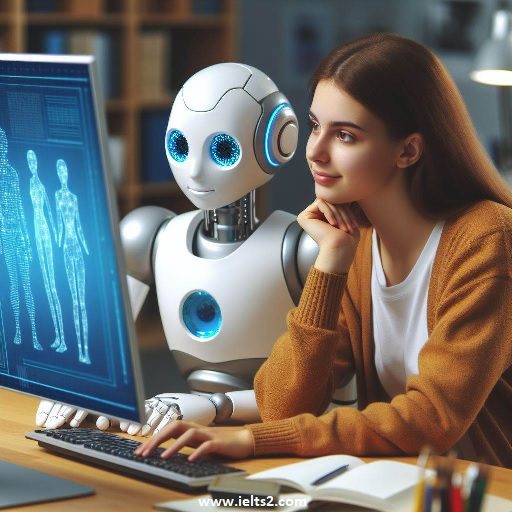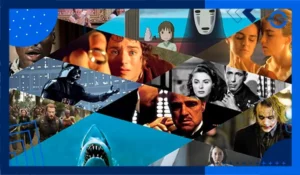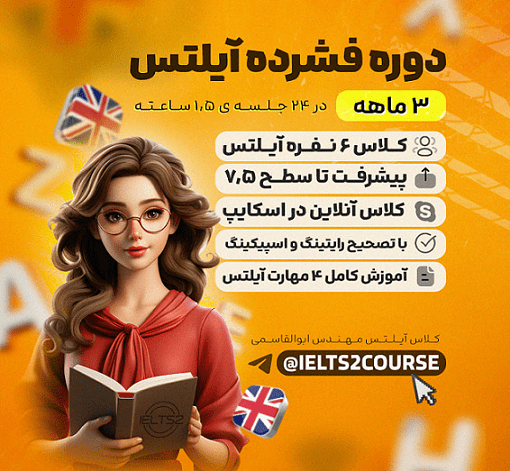نمونه سوالات اسپیکینگ آیلتس درباره هوش مصنوعی (پارت 1 2 3)
در این بخش بیش از 20 مورد از نمونه سوالات اسپیکینگ آیلتس نمره 9 درباره “هوش مصنوعی” را با هم میبینیم. این مجموعه از آخرین سوالات گزارش شده از سنترهای برگزار کننده آیلتس در ایران و خارج از کشور مربوط به پارت 1، 2 و 3 می باشند و شانس تکرار آن ها در آینده بالاست. در ادامه مطلب همچنین نکات گرامری، لغات و دلایل دریافت نمره 9 را به طور مشخص توضیح داده ایم تا راهنمایی برای علاقمندان باشد. 1000 نمونه سوالات اسپیکینگ آیلتس با جواب PDF پارت 1 2 3 پیشنهاد بعدی ما به شما عزیزان است.
نمونه سوالات اسپیکینگ آیلتس درباره هوش مصنوعی (پارت 1)
1. Do you like artificial intelligence?
Absolutely! AI has revolutionized the way we interact with technology, making daily tasks more efficient. I particularly admire its role in automating repetitive work, enhancing medical research, and even personalizing online experiences. Though some worry about its impact on jobs, I see AI as a tool that can complement human intelligence rather than replace it. With responsible development, AI has the potential to improve society significantly.
2. How often do you use AI in your daily life?
I interact with AI every day, often without realizing it. From using virtual assistants like Siri and Google Assistant to AI-powered recommendation systems on Netflix and Spotify, it plays a crucial role. Even when browsing the internet, AI algorithms tailor search results to my preferences. Additionally, AI-driven tools such as grammar checkers and chatbots enhance productivity in both work and study.
3. What are some advantages of AI?
AI offers numerous benefits, including efficiency, accuracy, and automation. In healthcare, it helps diagnose diseases faster than humans. In business, AI-powered analytics optimize decision-making. Additionally, AI enhances convenience in daily life by personalizing content and automating mundane tasks. While some fear AI replacing jobs, it actually creates new opportunities by shifting the workforce toward more creative and strategic roles.
4. Do you think AI has changed the way people communicate?
Absolutely. AI-powered chatbots, voice assistants, and translation tools have transformed communication. AI facilitates instant translations, allowing people from different linguistic backgrounds to connect effortlessly. Moreover, social media algorithms personalize feeds, influencing how people interact online. However, some argue that AI-driven communication lacks human warmth, emphasizing the need for a balance between technology and personal interaction.
5. Do you think AI will replace human jobs in the future?
AI will likely automate repetitive and labor-intensive tasks, but it won’t replace jobs requiring creativity, critical thinking, and emotional intelligence. Instead, it will redefine job roles, necessitating reskilling. For instance, while AI can assist in medical diagnoses, human doctors are irreplaceable due to their ability to empathize and make ethical decisions. AI should be seen as an augmentation tool rather than a direct competitor to human workers.
6. Are you worried about AI becoming too powerful?
While AI holds incredible potential, unchecked development could pose risks, such as ethical concerns and security threats. If AI surpasses human intelligence without adequate regulations, it may lead to unintended consequences. Therefore, it’s crucial to establish ethical guidelines and ensure AI development aligns with human values, promoting transparency, fairness, and accountability.
7. How do you think AI is helping education?
AI is transforming education by offering personalized learning experiences, automating administrative tasks, and providing instant feedback. AI-driven platforms like Duolingo and Coursera adjust lessons based on individual progress, enhancing efficiency. Moreover, AI tutors assist students in overcoming learning gaps, making education more accessible. However, despite these advantages, human teachers remain essential for fostering creativity, mentorship, and emotional support.
8. Have you ever used an AI-powered device?
Yes, I use multiple AI-powered devices daily. My smartphone features AI-driven assistants like Google Assistant, which helps schedule tasks and answer queries. I also use AI-enhanced cameras that optimize photos based on lighting and conditions. Additionally, I rely on smart home devices, such as voice-controlled lights and AI-powered security systems, making everyday life more convenient and secure.
9. Do you think AI can be creative?
Yes, AI can demonstrate creativity, but it differs from human creativity. AI-generated art, music, and literature are impressive, as seen with tools like OpenAI’s DALL·E and ChatGPT. However, AI lacks emotions, intuition, and originality that define human creativity. It can mimic patterns and generate novel outputs, but true innovation still requires human inspiration and context.
10. Would you trust an AI to make important decisions for you?
It depends on the context. For tasks involving data-driven decisions, such as financial analysis or medical diagnoses, AI can enhance accuracy. However, for ethical and personal decisions, human judgment remains irreplaceable. While AI can provide insights, humans must retain control, ensuring decisions reflect values, emotions, and contextual understanding.
نمونه سوالات اسپیکینگ آیلتس درباره هوش مصنوعی (پارت 2)
Describe how artificial intelligence is changing the world.
You should say:
- What artificial intelligence is
- How it is being used in different industries
- The benefits and challenges of AI
- How it might evolve in the future
Band 9 Sample Answer
Artificial intelligence (AI) is a transformative technology that enables machines to mimic human intelligence. It includes machine learning, natural language processing, and computer vision, allowing systems to analyze data, recognize patterns, and make decisions with minimal human intervention.
AI is revolutionizing various industries. In healthcare, AI-powered diagnostic tools assist doctors in detecting diseases such as cancer at an early stage. In finance, AI algorithms predict market trends and prevent fraudulent activities. The automotive industry benefits from self-driving technology, while AI-driven robots enhance efficiency in manufacturing. Additionally, virtual assistants like Siri and Alexa have become an integral part of our daily lives.
The advantages of AI are undeniable. It enhances efficiency, reduces human error, and allows businesses to make data-driven decisions. AI also automates repetitive tasks, enabling professionals to focus on more strategic work. However, there are challenges as well. Job displacement is a major concern, as automation may replace certain roles. Additionally, ethical concerns, such as biased algorithms and data privacy, require careful regulation.
In the future, AI is expected to become even more advanced, integrating with quantum computing to solve complex problems at an unprecedented scale. While AI will continue to improve human lives, ensuring ethical AI development and workforce adaptation will be crucial. Overall, AI is a double-edged sword—its impact depends on how responsibly we harness its power.
نمونه سوالات اسپیکینگ آیلتس درباره هوش مصنوعی (پارت 3)
1. How is AI affecting the job market?
AI is transforming the job market by automating repetitive tasks, increasing efficiency, and reducing costs for businesses. While it creates new opportunities in tech-related fields, it also replaces certain low-skilled jobs. For example, AI-powered chatbots are replacing customer service representatives, and self-checkout systems are reducing the need for cashiers. However, AI also generates demand for skilled professionals in data science, AI development, and cybersecurity. To adapt, workers must upskill and reskill to remain relevant in the changing job landscape. Governments and organizations should focus on education and training programs to ensure a smooth transition. Ultimately, AI will reshape employment rather than eliminate it entirely, emphasizing the need for lifelong learning.
2. What are the main ethical concerns regarding AI?
AI raises several ethical concerns, including bias, privacy, and job displacement. AI systems learn from historical data, which can contain biases, leading to unfair decision-making in areas like hiring or law enforcement. Additionally, AI-powered surveillance and data collection raise concerns about privacy, as companies and governments can misuse personal data. Another issue is accountability—if an AI system makes a mistake, it is unclear who should be held responsible. Moreover, as AI replaces human jobs, economic inequality may increase, leading to social instability. To address these concerns, governments and tech companies must implement strict regulations, ensure transparency in AI algorithms, and prioritize ethical AI development to prevent harmful consequences.
3. Will AI ever surpass human intelligence?
AI is advancing rapidly, but surpassing human intelligence—known as Artificial General Intelligence (AGI)—is still theoretical. Currently, AI excels in specific tasks, such as image recognition and data analysis, but it lacks human-like reasoning, creativity, and emotional intelligence. While some experts predict AGI could be achieved in the next few decades, others argue it may never happen due to the complexity of human cognition. Even if AI reaches human-level intelligence, ethical and safety concerns will arise, including the potential loss of human control over machines. The key challenge is ensuring AI remains beneficial and aligned with human values. For now, AI remains a tool to enhance human capabilities rather than replace them entirely.
4. Should AI be regulated by governments?
Yes, AI should be regulated to ensure its ethical and responsible development. Without proper regulations, AI can be misused for unethical purposes, such as surveillance, misinformation, and biased decision-making. Regulations can help establish guidelines for transparency, data privacy, and accountability. For example, laws should require companies to disclose how AI algorithms make decisions to prevent discrimination. Additionally, regulations can ensure AI-driven automation does not harm workers by promoting policies that support job transitions. However, overregulation could slow innovation, so governments must strike a balance between promoting technological progress and protecting society. International cooperation is also essential, as AI’s impact extends beyond national borders.
5. How is AI being used in education?
AI is transforming education by personalizing learning experiences, automating administrative tasks, and enhancing accessibility. Adaptive learning platforms use AI to analyze students’ progress and tailor lessons to their individual needs, making learning more effective. AI-powered chatbots assist students by answering questions and providing tutoring support. Additionally, AI-driven speech recognition technology helps students with disabilities access educational content. Teachers also benefit from AI, as it automates grading and administrative tasks, allowing them to focus more on teaching. However, AI should complement, not replace, human educators, as emotional intelligence and mentorship remain crucial aspects of education. With responsible implementation, AI can make education more efficient, inclusive, and engaging.
6. What are the risks of AI in warfare and security?
AI has significant implications for warfare and security, both positive and negative. On the positive side, AI enhances cybersecurity by detecting cyber threats and preventing attacks. It also helps in intelligence gathering, surveillance, and border security. However, AI-powered autonomous weapons pose serious risks, as they could make lethal decisions without human oversight, leading to unintended casualties. Additionally, AI-driven cyber warfare could destabilize nations by disrupting infrastructure and spreading disinformation. Ethical concerns arise when AI is used for surveillance, potentially violating privacy rights. To mitigate these risks, international agreements should regulate AI in military applications to prevent its misuse and ensure human control over lethal AI systems.
7. How does AI impact creativity and the arts?
AI is influencing creativity and the arts in both positive and controversial ways. AI-generated music, paintings, and literature demonstrate that machines can assist in creative processes. Tools like OpenAI’s DALL·E and ChatGPT help artists generate ideas and automate tasks, enhancing productivity. However, some argue that AI lacks true creativity, as it only recombines existing data rather than producing original thought. Additionally, AI-generated content raises ethical concerns about authorship and intellectual property. While AI can support artists, it should be seen as a tool rather than a replacement for human creativity. Ultimately, the fusion of AI and human creativity can lead to innovative artistic expressions and new forms of storytelling.
8. What role does AI play in healthcare?
AI is revolutionizing healthcare by improving diagnostics, treatment, and patient care. AI-powered tools analyze medical images, such as X-rays and MRIs, to detect diseases like cancer more accurately and quickly than human doctors. AI-driven chatbots assist patients by providing medical advice and scheduling appointments. Robotic surgeries, guided by AI, enhance precision and reduce recovery time. Additionally, AI predicts disease outbreaks by analyzing vast amounts of health data. However, challenges remain, including data privacy concerns and the need for human oversight. While AI enhances efficiency, it should complement rather than replace medical professionals, ensuring ethical and accurate healthcare services.
9. Can AI help solve global challenges like climate change?
Yes, AI can play a crucial role in addressing global challenges like climate change. AI-powered algorithms analyze climate data, helping scientists predict weather patterns and natural disasters. AI also optimizes energy consumption by making smart grids more efficient, reducing waste. In agriculture, AI monitors soil health and improves crop yields, promoting sustainable farming. Additionally, AI is used in environmental monitoring, detecting deforestation and pollution. However, AI itself requires significant computing power, which consumes energy. To maximize its benefits, AI must be used alongside sustainable technologies and policies. While AI alone cannot solve climate change, it is a valuable tool in mitigating its effects.
10. What skills will be most valuable in an AI-driven future?
As AI automates routine tasks, human skills that complement AI will become increasingly valuable. Critical thinking, problem-solving, and creativity will be essential, as AI lacks the ability to think outside the box. Emotional intelligence and interpersonal skills will also be crucial, as human interaction remains vital in professions like healthcare, counseling, and leadership. Additionally, technical skills such as programming, data analysis, and AI ethics will be in high demand. Adaptability and lifelong learning will be key, as the job market continuously evolves. Ultimately, a combination of technical expertise and soft skills will help individuals thrive in an AI-driven world
دلایلی که پاسخ های فوق در سطح نمره 9 قرار دارند:
1. محتوا و گسترش ایدهها (Task Response & Development)
- پاسخها کاملاً مرتبط با سؤال هستند و به تمام بخشهای آن بهصورت جامع پاسخ دادهاند.
- هر ایده بهطور کامل توضیح داده شده و با مثالهای واقعی و بهروز پشتیبانی شده است.
- استدلالها در پاسخ به سوالات اسپیکینگ آیلتس درباره هوش مصنوعی کاملاً منطقی هستند و هیچ بخش پاسخ سطحی یا کلیگویی ندارد.
2. دایره لغات گسترده (Lexical Resource)
- از طیف وسیعی از واژگان مرتبط با هوش مصنوعی و تکنولوژی استفاده شده است (مثلاً machine learning, automation, surveillance, cybersecurity, adaptive learning, quantum computing).
- استفاده از کلمات و عبارات پیشرفته، اما در عین حال طبیعی و بدون تلاش مصنوعی برای پیچیدگی.
- اصطلاحات و ترکیبات متنوعی در متن دیده میشود، مثل double-edged sword, lifelong learning, striking a balance, ethical concerns, human oversight.
3. ساختارهای گرامری متنوع و دقیق (Grammatical Range & Accuracy)
- استفاده از ساختارهای پیچیده و پیشرفته، مانند جملات شرطی (If AI surpasses human intelligence, it will raise ethical concerns)، جملات مجهول (AI is being used in various industries)، و جملات ربطی (One of the biggest challenges, which AI developers face, is bias).
- عدم وجود هیچگونه اشتباه گرامری، که نشاندهنده مهارت کامل در گرامر زبان انگلیسی است.
4. روانی و انسجام (Fluency & Coherence)
- پاسخ به سوالات اسپیکینگ آیلتس درباره هوش مصنوعی بدون توقف غیرضروری و کاملاً روان نوشته شدهاند.
- استفاده از عبارات ربطی متنوع برای ایجاد پیوستگی در متن، مانند However, On the other hand, Ultimately, In contrast, As a result, Consequently, Moreover.
- ساختار هر پاسخ بهصورت منطقی تنظیم شده و یکپارچگی ایدهها حفظ شده است.
5. لحن طبیعی و آکادمیک (Pronunciation & Tone in Speech)
- این پاسخها کاملاً به سبک آکادمیک و طبیعی نوشته شدهاند و شبیه به گفتار یک فرد نیتیو به نظر میرسند.
- هیچ بخشی از پاسخ غیرطبیعی یا ترجمهشده به نظر نمیرسد، بلکه انگار فرد بهصورت خودجوش و آگاهانه در مورد موضوع صحبت میکند.
تعیین سطح رایگان اسپیکینگ ❤️
نمونه سوالات اسپیکینگ آیلتس درباره “هوش مصنوعی” پارت 1 2 3 را به همراه سمپل های نمره 9 آن ها با هم دیدیم. در ادامه نمونه سوالات دسته بندی شده اسپیکینگ آیلتس پیشنهاد آخر ما به دوستان گرامی هست. این نمونه سوالات اسپکینگ از پرتکرار ترین تاپیک های این بخش و همچنین جدیدترین موضوعات می باشند. این مجموعه توسط یکی از سایت های معتبر و فعال آیلتس تنظیم شده است. همچنین برای تعیین سطح و تعیین رایگان نمره اسپیکینگ و دریافت جدید ترین سمپل های نمره 9 در کانال تلگرام اسپیکینگ ما همراه باشید و به ادمین برای تعیین نمره اطلاع دهید.








